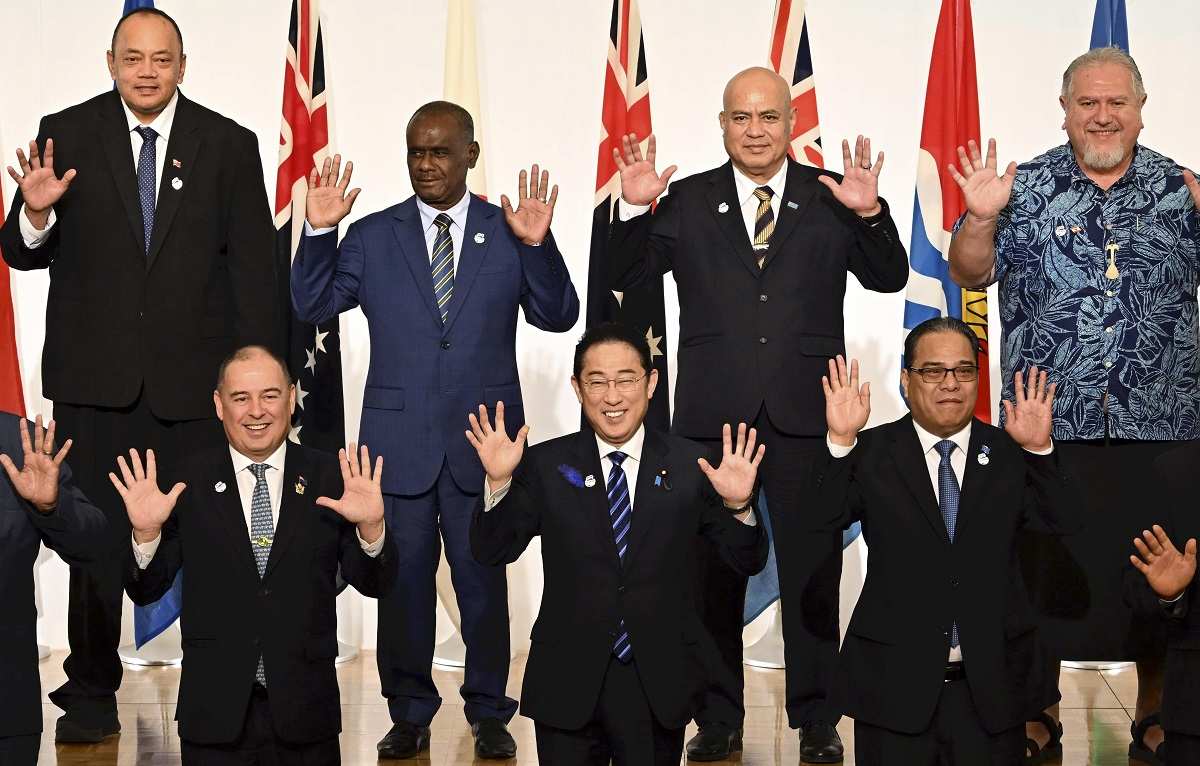Pacific Islands Leaders Not Totally in Tune on China Approach as Meeting Ends in Tokyo; Positions Differ on Treated Water, Joint Drills

Prime Minister Fumio Kishida, front center, and other participants in the Pacific Islands Leaders Meeting wave for a photograph in Minato Ward, Tokyo, on Thursday.
20:00 JST, July 19, 2024
The Pacific Islands Leaders Meeting wrapped up Thursday in Tokyo with a declaration that expressed unity, but there were notable differences between some nations’ positions regarding China, which has increased its involvement in the region in recent years.
The leaders’ declaration issued after the summit, which was attended by leaders of Japan and Pacific island nations, declared “strong opposition to any unilateral attempts to change the status quo.” However, discussions on the declaration had briefly become bogged down on the issue of the discharge of treated water into the Pacific Ocean from Tokyo Electric Power Company Holdings Inc.’s Fukushima No. 1 nuclear power plant.
At a joint press conference with Cook Islands counterpart and meeting co-chair Mark Brown after the summit, Prime Minister Fumio Kishida insisted the summit participants were on the same page on key issues.
“Japan and the island nations share the values and principles of the rule of law and democracy and oppose any unilateral attempts to change the status quo through the use of force,” Kishida said.
Kishida’s comment was aimed at China, which is continuing its assertive advances in the East China and South China seas.
Although the leaders’ declaration avoided mentioning China directly by name, Japan was instrumental in ensuring it contained the line: “Leaders also shared the importance of the free and open international rules-based order.”
China has been bolstering its influence in the Pacific region through the construction of massive infrastructure projects and other methods. Chinese President Xi Jinping himself has ramped up diplomatic efforts in the region, and there have been glimpses of some Pacific nations adopting increasingly pro-Beijing positions.
The hesitation of some of the leaders to back the expression used for describing the discharged treated water in the declaration was a clear indication of this. The declaration stated that the leaders “concurred on the importance of being based on scientific evidence in this matter.”
The Japanese government has been repeatedly using the expression “the importance of being based on scientific evidence” to counter arguments from China, which calls the treated water “nuclear contaminated.”
The International Atomic Energy Agency recognizes that the treated water is being discharged in line with international safety standards. At the joint press conference however, Brown reiterated that the discharged water must not threaten the health and welfare of the peoples of the Pacific or harm the maritime environment.
A draft of the joint action plan compiled alongside the declaration stated that Japan’s Self-Defense Forces would conduct joint exercises with military forces of the Pacific nations, but this sparked pushback from some countries and was eventually omitted.
“The island nations hailed Japan’s efforts through the summit meeting, but China’s presence is steadily increasing year after year,” a senior Japanese government official warned.
Top Articles in World
-

Israeli Ambassador to Japan Speaks about Japan’s Role in the Reconstruction of Gaza
-

Videos Plagiarized, Reposted with False Subtitles Claiming ‘Ryukyu Belongs to China’; Anti-China False Information Also Posted in Japan
-

Chinese Embassy in Japan Reiterates Call for Chinese People to Refrain from Traveling to Japan; Call Comes in Wake of ¥400 Mil. Robbery
-

Nepal Bus Crash Kills 19 People, Injures 25 Including One Japanese National
-

Russia: Visa Required for Visiting Graves in Northern Territories, Lifting of Sanctions Also Necessary
JN ACCESS RANKING
-

Producer Behind Pop Group XG Arrested for Cocaine Possession
-

Japan PM Takaichi’s Cabinet Resigns en Masse
-

Man Infected with Measles Reportedly Dined at Restaurant in Tokyo Station
-

Israeli Ambassador to Japan Speaks about Japan’s Role in the Reconstruction of Gaza
-

Videos Plagiarized, Reposted with False Subtitles Claiming ‘Ryukyu Belongs to China’; Anti-China False Information Also Posted in Japan
























